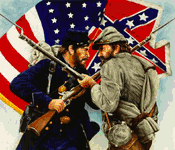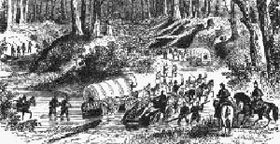 |
Civil War Battles |
|
State War Records |
| AL - AK - AZ - AR - CA - CO - CT - DE - FL - GA - HI - ID - IL - IN - IA - KS - KY - LA - MA - MD - ME - MI - MN - MS - MO - MT - NE - NV - NH - NJ - NM - NY - NC - ND - OH - OK - OR - PA - RI - SC - SD - TN - TX - UT - VT - VA - WA - WV - WI - WY |
The Battle of Poison Spring
April 18, 1864 in Ouachita County, Arkansas
 |
|||||||||||||||||||
|
Dwindling supplies for his army at Camden forced Maj. Gen. Fred Steele to send out a foraging party to gather corn that the Confederates had stored about 20 miles up the Prairie D'Ane-Camden Road on White Oak Creek.
On April 17, a train of 198 wagons was sent westward along the upper Washington Road to collect corn and other foodstuffs. After loading the wagons with corn, they camped 18 miles west of Camden. At sunup they began the march to Camden.
Soon, the received reinforcements bringing the total force to 875 infantry (including the First Kansas Colored). 90 cavalry troopers, and a 4-gun battery of artillery including 2 mountain howitzers, and 2 rifled cannon. The Confederates, observing this movement, gathered some 3100 cavalry, and 8 cannon under Brig. Gen. Samuel B. Maxey and Brig. Gen. John S. Marmaduke.
On April 18, Col. James M. Williams started his return to Camden. Marmaduke's and Maxey's Confederate forces arrived at Poison Spring, about 15 miles from Camden, where they engaged Williams. The Confederates blocked the Union advance and eventually attacked Williams in the front and rear forcing him to retreat north into a marsh. Several times the Federals tried to make a stand, only to be pushed back beyond the stalled train. After a fierce battle, including a furious charge by a regiment of Confederate Choctaw Indians, the Federals broke in rout and were pursued for about 2 miles. The train was stalled. Fighting took place along both sides of the road. The Union men regrouped and then fell back to Camden.
The Union lost 198 wagons and all the corn. The Confederates captured the four cannon, complete with limbers and caissons, 170 wagons (the others being burned) and teams, took over 100 prisoners, and buried 181 Union troops. Many men of the 1st Kansas Colored Infantry didn't make it back, thanks to revenge killings by Confederates from the border regions and also scalpings by Native Americans in Confederate service whose homes in the Indian Territory had been raided.
Additionally, the loss created much indignation in the Union camp as well as aggravating the critical supply situation.
The victory at Poison Spring, along with the arrival of Brig. Gen. E. Kirby Smith with 3 infantry divisions, and the report of the defeat of Maj. Gen. Nathaniel P. Banks in Louisiana, raised Confederate hopes that they could cut off the supply lines and capture the entire Union army.
